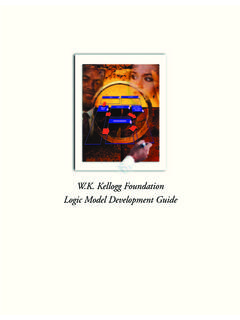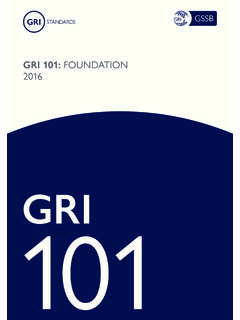Transcription of RETHINKING THE FUTURE OF PLASTICS & CATALYSING ACTION
1 THE NEW PLASTICS ECONOMY: RETHINKING THE FUTURE OF PLASTICS & CATALYSING ACTIONRETHINKING THE FUTURE OF PLASTICS 1 THE NEW PLASTICS ECONOMY: RETHINKING THE FUTURE OF PLASTICS & CATALYSING ACTION2 THE NEW PLASTICS ECONOMYTHE NEW PLASTICS ECONOMY 3 PREFACE 5 FOREWORD 6 RETHINKING THE FUTURE OF PLASTICS 11 THE NEW PLASTICS ECONOMY CATALYSING ACTION 35 ACKNOWLEDGEMENTS AND DISCLAIMER 56 ABOUT THE ELLEN MACARTHUR FOUNDATION 57 ABOUT UN
2 ENVIRONMENT - MEDITERRANEAN ACTION PLAN 59 ENDNOTES 604 THE NEW PLASTICS ECONOMYTHE NEW PLASTICS ECONOMY 5 PREFACEP lastics are the workhorse materials of the modern economy, combining unrivalled functionality with low cost. While integral to the economy, their linear take-make-dispose value chains have significant economic and environmental drawbacks as most of the material ends up as waste. Businesses and governments are now, for the first time, recognising the need to fundamentally rethink the global PLASTICS New Plastic Economy provides a bold vision of a PLASTICS system that works: a circular economy for PLASTICS .
3 In two acclaimed analytical reports, both launched at World Economic Forum annual meetings in Davos, the Ellen MacArthur Foundation has outlined this vision and a set of concrete actions to harness the benefits of plastic while addressing its drawbacks. This document comprises the main findings of both reports. Aiming to build momentum towards such a system in which PLASTICS never become waste, the Ellen MacArthur Foundation also launched the New Plastic Economy initiative in 2016. The ambitious vision behind it, aligned with the principles of the circular economy, has inspired a broad range of leading businesses across the PLASTICS value chain, philanthropists, cities and governments worldwide to participate in this initiative.
4 Stakeholder engagement and cross-value chain collaboration are essential to the New PLASTICS Economy initiative in order to create the long-term solution of system change. Hence, the initiative is naturally led to involve policymakers and international institutions, as much as the private sector and entrepreneurs. Therefore, working with the Regional Activity Centre for Sustainable Consumption and Production, hosted by the Catalan Waste Agency, and operating under the Mediterranean ACTION Plan of the United Nations Environment Programme (UN Environment) to bring the main findings of these two reports to a wider community of stakeholders represents an encouraging step for the transition to a circular system for PLASTICS .
5 The dissemination of these summary versions, in both English and French, is a unique way to trigger FUTURE opportunities among a wide readership in the Mediterranean area. Mr. Gaetano Leone, UN Environment/MAP Coordinator, Mr. Josep Maria Tost i Borr s, Director of the Catalan Waste Agency and Mr. Enrique de Villamore Mart n, SCP/RAC Director, have kindly provided the foreword to this document, pointing out the strong case for changing the PLASTICS system, as the current one has shortcomings clearly visible in the Mediterranean area.
6 They also explain how both private and public sector need to be involved in moving towards a circular system for PLASTICS , capturing the environmental and economic opportunities. We very much look forward to seeing further progress towards a PLASTICS system that works, and to supporting efforts in that direction where we can, both in the Mediterranean area and ELLEN MACARTHUR6 THE NEW PLASTICS ECONOMYFOREWORDThe Mediterranean Region boasts unique, rich biodiversity and has been the birthplace of countless historically significant developments for Western civilisation.
7 Unfortunately, the Region has been strongly impacted by marine litter of all sizes, found almost everywhere: stranded along the coastlines, floating on the surface and on the water column and lying on the seafloor. Of particular concern is the occurrence of microplastics in the Mediterranean, which have been found in very comparable quantities to those encountered in the oceanic gyres also known as plastic soups . Marine litter can have severe consequences for the Region s biological resources and the human communities that depend on them, from a health, environmental and economic perspective.
8 Increasingly, studies are showing that marine litter directly affect living organisms, especially through entanglement with macro- PLASTICS and ingestion of micro- PLASTICS . There is also growing evidence that plastic particles may carry and transfer toxic substances (in particular, persistent organic pollutants and endocrine disruptors) to marine organisms, mainly when ingested, and currently, scientists are focusing on the risk of possibly hazardous plastic particles transferring via food , clean-up activities are a short-term necessity, but addressing the source of this problem in the long term can only happen by changing the way we produce and use PLASTICS .
9 Addressing this issue at the source is also high in the science and policy agenda. The shift towards a circular economy in which PLASTICS never become waste, while creating economic opportunities, seems to be an effective strategy for tackling the problem of marine litter. This transition will require coordinated actions from policy makers, waste managers, the private sector and financial actors. Appropriate policy regulations must be developed to create an enabling environment. Waste management systems need to be improved, to become more efficient mainly via increasing collection and recycling rates of plastic-related waste.
10 The private sector needs to play a crucial role in driving the development of innovative business models, packaging design, materials and technologies in line with the circular economy, that provide sustainable solutions to valorise used PLASTICS and thus reduce plastic waste. The development of these solutions can be an economic opportunity for both new and existing businesses. Finally, financial actors will be counted on so that solutions for keeping PLASTICS in the economy and out of the precious Mediterranean Sea can reach scale promptly.






